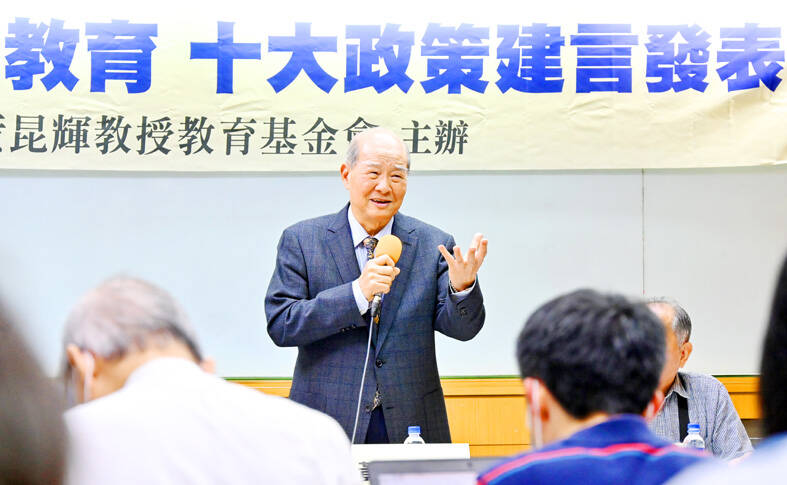The nation’s education system needs reforms ranging from kindergarten to vocational schools and technical training, including mandatory education starting from the age of five, a non-governmental organization said yesterday.
“Our society has strong concerns over public education, and has an increased interest in the topic before the election. This is a good time to reform Taiwan’s education system, as voters and candidates are discussing their demands, ideas and policies to cure deficiencies,” Professor Huang Kun-huei Education Foundation chairman Huang Kun-huei (黃昆輝) said.
Education reforms should be based on equality and excellence as core values, with adaptive development and cultivating talent in the long term in mind, he said.

Photo: George Tsorng, Taipei Times
Huang presented recommendations including that the national education system include free and mandatory public schooling for kindergartners aged five or six, and that elementary and junior-high schools provide competency-based education.
Higher education should aim to train professional talent, and technical and vocational schools should train students with transition of industry sectors in mind, he added.
The national curricula should include content aiming to cultivate global citizens, develop digital learning, create a fun and happy environment in school, prioritize education for the underprivileged, improve teachers’ skills and capacity, and promote lifelong learning, Huang said.
Extending public education to five-year-olds has been a worldwide trend that is already in place in countries with lower GDPs than Taiwan like Greece, Poland, Hungary, Argentina, Mexico and the Philippines, foundation convener Kuo Sheng-yu (郭生玉) said.
“This proposal has been discussed for 40 years in Taiwan, but there has been only noise, but no real action,” Kuo said.
Taiwan is facing shrinking student numbers due to the declining birthrate, Kuo said, adding that government should provide more autonomy for universities and ensure their self-sufficiency.
Universities should forge partnerships with the private sector to receive financial support, and establish “teams of excellence” based on each school’s specialized fields and advantages to boost international visibility, he said.
Technical and vocational training in the past did not match needs of industries, and lacked apprenticeship and working experience, therefore adjustments are needed to provide students with on-the-job training, in addition to promoting closer school-industry collaboration, Kuo said.
The government should boost digital education and e-learning platforms for people and also raise their awareness to better understand environment-related global issues and sustainable economic development, Huang said, adding that the government should also encourage students to take part in international activities and broaden their outlook.
School teachers should receive training to improve their digital teaching skills, Huang said.
Foundation executives also said survey results show an increase in mental issues, with student suicides and self-inflicted injuries on the rise, but schools in general lack counselors and resources to handle these issues.
Curricula should incorporate emotional and mental health, they said.
“Teachers must receive training to help create fun and happy environment in school with an aim to provide equal education for everyone,” Huang said. “We must help the underprivileged students access education, so the government can increase the quota for university subsidies and it should aim to attract qualified teachers to work in rural areas to improve learning environment in those places.”

An essay competition jointly organized by a local writing society and a publisher affiliated with the Chinese Communist Party (CCP) might have contravened the Act Governing Relations Between the People of the Taiwan Area and the Mainland Area (臺灣地區與大陸地區人民關係條例), the Mainland Affairs Council (MAC) said on Thursday. “In this case, the partner organization is clearly an agency under the CCP’s Fujian Provincial Committee,” MAC Deputy Minister and spokesperson Liang Wen-chieh (梁文傑) said at a news briefing in Taipei. “It also involves bringing Taiwanese students to China with all-expenses-paid arrangements to attend award ceremonies and camps,” Liang said. Those two “characteristics” are typically sufficient

A magnitude 5.9 earthquake that struck about 33km off the coast of Hualien City was the "main shock" in a series of quakes in the area, with aftershocks expected over the next three days, the Central Weather Administration (CWA) said yesterday. Prior to the magnitude 5.9 quake shaking most of Taiwan at 6:53pm yesterday, six other earthquakes stronger than a magnitude of 4, starting with a magnitude 5.5 quake at 6:09pm, occurred in the area. CWA Seismological Center Director Wu Chien-fu (吳健富) confirmed that the quakes were all part of the same series and that the magnitude 5.5 temblor was

The brilliant blue waters, thick foliage and bucolic atmosphere on this seemingly idyllic archipelago deep in the Pacific Ocean belie the key role it now plays in a titanic geopolitical struggle. Palau is again on the front line as China, and the US and its allies prepare their forces in an intensifying contest for control over the Asia-Pacific region. The democratic nation of just 17,000 people hosts US-controlled airstrips and soon-to-be-completed radar installations that the US military describes as “critical” to monitoring vast swathes of water and airspace. It is also a key piece of the second island chain, a string of

The Central Weather Administration has issued a heat alert for southeastern Taiwan, warning of temperatures as high as 36°C today, while alerting some coastal areas of strong winds later in the day. Kaohsiung’s Neimen District (內門) and Pingtung County’s Neipu Township (內埔) are under an orange heat alert, which warns of temperatures as high as 36°C for three consecutive days, the CWA said, citing southwest winds. The heat would also extend to Tainan’s Nansi (楠西) and Yujing (玉井) districts, as well as Pingtung’s Gaoshu (高樹), Yanpu (鹽埔) and Majia (瑪家) townships, it said, forecasting highs of up to 36°C in those areas